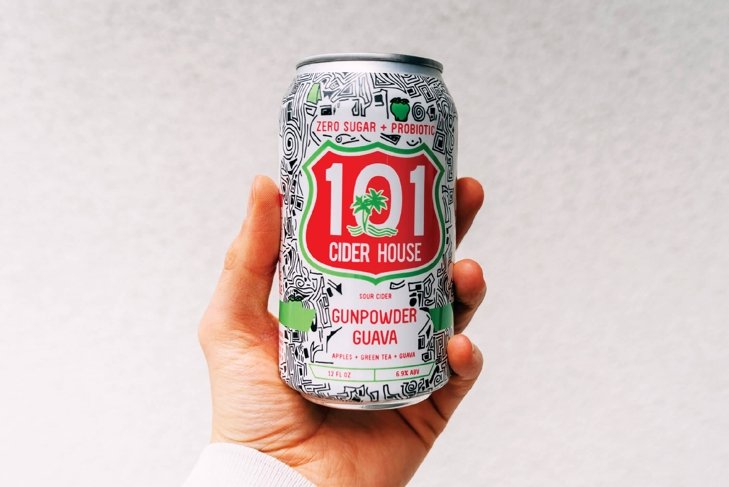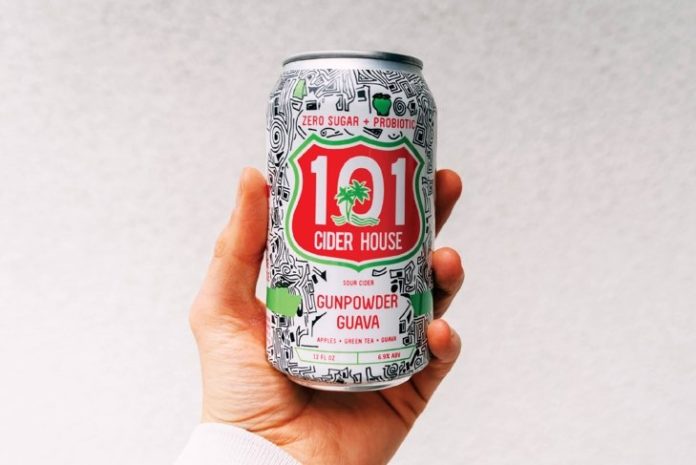
Move over, natural wine. Probiotic cider might just be the next big thing in imbibing.
In Downtown Los Angeles near Chinatown, just around the corner from culinary celebrity David Chang’s Majordōmo restaurant and the swanky cocktail hideaway Apothéke, you’ll find a destination of a different stripe: 101 Cider House. While other popular establishments in the neighborhood lean on the area’s industrial vibe, 101 Cider House captures the essence of LA’s coastal communities. “When you come in, you’re going to feel like you’re in a Malibu surf shack,” says founder and CEO Mark McTavish.
The wooden bar makes you feel like you’re hiding under a pier, and its chairs give you the chance to live out dreams of being a lifeguard, fresh white life preservers hanging overhead. Surfboards are propped up decoratively along the walls. Outside, a sprawling mural by Jonny Alexander that took four weeks to paint portrays the sun setting over a 200-year-old LA coastline, native plants running from the Santa Monica Mountains to the Palos Verdes Peninsula. It harkens back to a simpler, more natural time—just like the cider that 101 Cider House creates and serves.
A longer, healthier happy hour
McTavish follows the rustic cider-making philosophy of northern Spain, where he spent time in 2014. He noticed people would drink cider at any time of day as a part of their lifestyle and culture, not as a vehicle for getting drunk. The region’s cider producers simply let apple juice sit in tanks until it ferments into alcohol. “It’s completely unadulterated—just whatever Mother Nature says,” says McTavish. “That’s what we want to put in the cans.”
McTavish’s ciders are made in small batches and aged for three months, resulting in bone-dry, carb- and sugar-free bevvies. These vegan ciders are tart—in fact, they’re known as “sour ciders.” They’re a far cry from the more readily available, sugary, mass-produced ciders most Americans are used to. Plus, 101 Cider House’s 6.9 percent ABV drinks are enhanced with natural ingredients.
“Instead of using just apples … we use things like spirulina and charcoal and cactus; pears and pineapples and basil,” says McTavish. “I thought: Wouldn’t it be beautiful if I could take all these different ingredients and ferment them the same way they do in Spain? And I’d be left with something that’s probiotic.”
That’s right. This cider is probiotic—all thanks to naturally occurring lactic acid bacteria in the drink. There are a whopping 6 billion CFUs of good-for-your-gut bacteria in each 12 oz serving of 101 Cider House sour cider, according to McTavish. “It’s a great adult beverage,” he says.
The inspiration behind the drink
McTavish used to work in the fitness industry as gym retailer, helping gyms get started in small towns. That’s when he first noticed a disconnect between how health-conscious people would normally behave and how they would let loose when drinking alcohol.
“I know that when they look at their food, they’re reading everything,” says McTavish. “What’s the carb content? What’s the protein content like? But then we would go out drinking, [and] none of that would matter.” Many fitness buffs seemed to figure that alcohol is unhealthy, period, so what’s the point of asking more questions?
The more McTavish thought about the problem, the more he wanted to solve it. In 2012, he got married and moved to LA to start a new chapter of his life. Having been a bartender and owned a craft beer bar before his tenure in the fitness world, McTavish decided to forge a new career that blended the two skill sets. He set out to create the world’s healthiest alcohol.
That resulted in the birth of 101 Cider House in 2015. It was originally a warehouse and cider production facility in Westlake Village. But as of January 2020, it has a new, public face: the beachy day club and taproom at 1700 Naud Street.
The sour cider experience
Although there’s food at 101 Cider House, the star of the show is the cider. McTavish doesn’t want the place to be a restaurant, so he’s opted for ready-to-go items made elsewhere (there’s no kitchen on site) to keep the focus on the drinks. Customers can peruse prepackaged plant-based items like chips and salsa or hummus, tossing their picks into a picnic basket and purchasing them at a cashier stand that’s lovingly dubbed the Snack Shack.
Then it’s off to the cabanas on the shaded outdoor patio made verdant by 16-foot-tall bamboo and grown palm trees. The plush 10-person cabanas welcome groups to linger. “They’re very comfortable,” says McTavish. “It makes you want to sit there all day long and hang out. You can shut the drapes, have your meeting, do your thing. You’ve got all the privacy you can ask for, but you still hear the ambient … music and the vibe that’s surrounding you because there might be 500 people in there having a good time.”
101 Cider House opens at 9 a.m., encouraging the same responsible, functional cider drinking that McTavish enjoyed in Spain. “We’re trying to turn night into day and have a more European-style experience,” he says. “We want to show people that when you drink … when the sun is shining and everyone can see you for what you are, then typically you have a more mindful approach to your consumption.”
In a city always on the hunt for what’s new and next, 101 Cider House is worthy of a healthy buzz.
Other buzz-worthy beverages
- Sour cider is just one of many beverages growing in popularity. Here are three other drinks of the moment—including a couple nonalcoholic ones.
- Seaweed-infused drinks – Seaweed is a low-calorie ingredient packed with nutrients. You can find seaweed extract in several bottled drinks, or you can purchase various types of seaweed yourself and throw them into your smoothie.
- Ready-to-drink shakes – Shakes have come a long way since SlimFast was founded in the ’70s. Today, you can choose from a wide range of plant-based protein shakes with enviable extras (like probiotics!) at your local natural grocer.
- Organic wines – These wines are taking the imbibing world by storm thanks to their environmentally sustainable production methods and funkier flavors.* (And yes, some of them are vegan!)
*Remember: If you do imbibe, you shouldn’t have more than one drink a day if you’re a woman or two drinks a day if you’re a man—regardless of the tastiness or potential health benefits of the drink!
Wondering what exactly lactic acid bacteria are good for? A lot, according to research—including stimulating the immune system and soothing allergies. The little guys aren’t lacking!
























